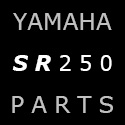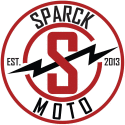Okay, I'm stumped here. I really like the bare metal look I have on many of my parts, but obviously keeping those parts from rusting is a pain. But if I paint the parts, how do I keep the paint from cracking and chipping when the parts get bolted together? Obviously most bikes on here are painted, so how do you keep the areas around the bolt holes or contact areas from being damaged in tightening everything up/vibration? This is kind of whats keeping me from reassembling everything. Thanks!
We noticed you are blocking ads. DO THE TON only works with community supporters. Most are active members of the site with small businesses. Please consider disabling your ad blocking tool and checking out the businesses that help keep our site up and free.
You are using an out of date browser. It may not display this or other websites correctly.
You should upgrade or use an alternative browser.
You should upgrade or use an alternative browser.
How to keep paint/powdercoat from cracking when bolting parts together?
- Thread starter loudboy
- Start date
carnivorous chicken
Over 1,000 Posts
I'll second JRK5892. Get better paint, or find a better powder coater.
Thanks for all the good info. I haven't painted them up yet, but I'll give it a shot. I've got a steel bar out in the yard right now with 1/3 Gibbs lube, 1/3 Flood brand penetrant, and 1/3 WD-40 to see which holds up better to moisture/rust, but if a clear powdercoat really is that tough then I guess I'll go for that and be done with it.
Well how about parts that have to be threaded together (like the nut over the end of the rear brake tie rod) or parts that slide past each other (like the front and rear folding-up footpegs)? Luckily those parts are easy enough to take off to recoat with the oil of choice, I guess...
BTW, mine is a '71 CB350. It say in mud for 15+ years, so all lower hardware had to be wirewheeled to bare metal and I like it that way.
BTW, mine is a '71 CB350. It say in mud for 15+ years, so all lower hardware had to be wirewheeled to bare metal and I like it that way.
that should all be masked... who is doing your coating work? it really sounds like a out of the garage operation... there is nothing wrong with that pending they prep and mask propperly... to me it sounds like the parts are under prepped and under (or over) cured, that is why they chip and crack, the masking is very important... i have posted up some pics in a thread in this section showing what we kicked out last week... you may want to take a peek at it, link below... and also below that is a link to our website we have THOUSANDS of pictures up in there if you have questions on masking and how it should be done. again we are more than happy to help you out, we specialize in custom coating and build bikes in the shop. I have built everything from single cylinder enfields to turbo bussa's and everything in between so we are very Knowledgeable as to what does and does not need masked. if you have any questions shoot away man that is what i am here for
http://www.dotheton.com/forum/index.php?topic=43233.0
www.thepowderpro.com
http://www.dotheton.com/forum/index.php?topic=43233.0
www.thepowderpro.com
Thanks for the knowledge. I am not having anyone do powder coating yet, I'm just doing my homework before-hand. Right now all my parts are bare steel. I understand that threaded/moving areas will need to be masked so that the paint/PC doesn't attach and then be ruined/prevent assembly, but then how do those un-painted areas that were masked get protected from rusting? Obviously many many people have restored old bikes here and have overcome the problem of old bare steel rusting. How? Is everyone chroming everything that sees motion (ie can't be painted). Are people disassembling chunks of their bikes every few weeks to rewax nooks and crevices? What am I not getting about preventing rust?
o1marc
Over 1,000 Posts
Washers on all bolts is the first thing I would do. Powder is tough but I have to disagree with no matter how tight you tighten the bolt it shouldn't hurt the powder. The head of that metal bolt is going to gouge right ito the powder. If we know this ahead of time we will mask circles where the bolts go. While the damage is under the bolt head as someone mentioned, water will still get in and start the failure process.




